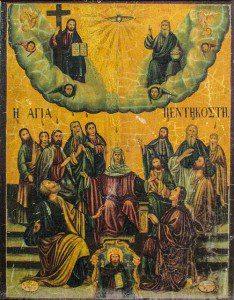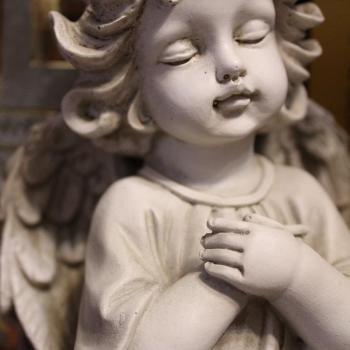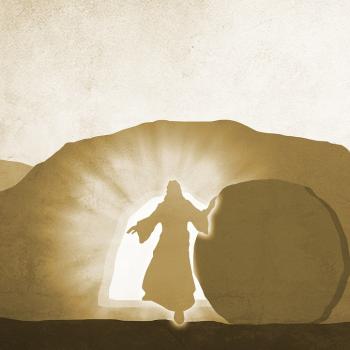A. Honest to God!
A story doesn’t have to be true in order to be inspirational. In fact, the greatest stories of all never even happened and, yet, have been the foundational myths of great nations and powerful religions. Take the Passover-Pentecost-Promised Land legend for instance. There is not a serious bible scholar alive today, who believes that the Exodus ever happened or that Moses ever existed. And, yet, the story of Moses leading the Israelites out of Egypt after 430 years of slavery, became the rallying mantra for the survival of the remnant of the Judeans who returned from the historically-factual exile in Babylon in the 6th century BCE, some 700 years after Moses’ fictitious exodus.
Pentecost was act two in the Moses drama. He received a new constitution of 613 articles from Yahweh on Mount Sinai, fifty days after the great escape. Hence the name, Pentecost (50 days in Greek) from the Hebrew, Shavuot (a week of weeks). This constitution would lick a ragtag bunch of disparate tribes into a united people and give birth to a powerful new religion – Judaism. The third act in the story would be the conquest of the Promised Land.
And piggybacking on this three-part story, Christianity will rework the Passover, Pentecost and Promised Land tale and spin it into Easter, the Descent of the Holy Spirit and the Kingdom of Heaven – the backbone of the most successful religious organization in history.
Great ideas and great stories inspire great transformations; they don’t have to be “real” to effect these changes. That is why oligarchies create their own “real stories” (fake news) and eliminate the dissenting storytellers (the prophets).
B. The Story of Numbers
And storytellers have a fascination with special numbers. So, the numbers 7 and 40 keep appearing in the Passover-Pentecost tale: seven times seven days after the great escape, Moses ascends Mount Sinai and communes with God for 40 days. Thereafter the Hebrews will wander in the desert for 40 years before they enter the promised land.
The fourth book of Torah (allegedly written by Moses) is called, “Numbers” because it contains the first census, by tribe, of the warriors of Israel. And in the most esoteric book of the New Testament, the Book of Revelation, the numbers 31/2, 7, 12, and 144 play a central role. In his version of the Good News, Luke places the Ascension of Jesus 40 days after his resurrection; Jesus had previously spent 40 days fasting in the desert before he began his public ministry; and Luke places Pentecost 50 days after the resurrection.
Whereas the original Pentecost resulted in a 613-item code, written on stone, and called, “The Law”, the Christian Pentecost would be a single-item system, written on the heart (just like the prophet Jeremiah had predicted 600 years before Jesus) and based on love-of-God-with-one’s-whole-being. What a pity this version of Christianity was not practiced by the leadership of the post-Constantine church.
And whereas the third part of the original story – the possession of the promised land – started with the Hebrew’s bloody conquest of Jericho in 1210 BCE, and ended with the bloody capture of Jerusalem in 1010 BCE, the third part of the Jesus version – according to the parable of the Good Samaritan – started in Jerusalem when a Hebrew traveler got mugged, left for dead and ignored by both Jewish priests and Jewish Levites, and ended up when he was rescued by “an enemy” who took him to Jericho and saved his life. A conquest by violence gives way to a conquest by love. The surest way – in the long haul – to overcome an enemy, is to respond with love. For 5,000 years we’ve tried to solve human problems by killing each other. Couldn’t we try love for even one century?
C. Mystical Self-empowerment or Centralized Control
The essence of John’s account of Pentecost is, I believe, the injunction to self-empowerment based on forgiveness. Let me explain what I mean. According to John, Pentecost and Resurrection happened on the same day. The resurrected Jesus materializes inside a fear-packed, locked room; he first offers forgiveness to the cowards who, when he had been arrested, had run and even denied they knew him. Then he breathed on them and said, “Receive the Holy Spirit [Pentecost], whose sins you shall forgive they are forgiven them and whose sins you shall retain they are retained.” The church latched onto this statement and made it a centerpiece of its own power-play, claiming that only the hierarchy, and its delegated representatives (priests) were empowered to pronounce the awesome phrase, “Ego te absolvo a peccatis tuis” (I forgive you from your sins.)
What Jesus was actually enjoining, on all his disciples, was the responsibility to forgive, not the privilege conferred on a few to be able to sacramentally bind or loose. The very first gift of the Holy Spirit was the loving insight that when we respond to the sins of other with compassion, understanding and forgiveness, everybody – victim and perpetrator alike – is set free spiritually, psychologically and, eventually, sociologically. On the other hand, when we respond to insult by hardening our hearts, everybody – victim and perpetrator alike – is chained, spiritually, psychologically and sociologically by fear and anger.
What a travesty that this extraordinary insight was hijacked and turned into a weapon of control. Eventually, all the “great” institutions and organizations learn that centralization of authority, pyramidization of power and control of the story are the keys to bureaucratic longevity. The Roman empire learned this lesson well: again, and again, the wild, independent Celtic chieftains defeated Rome in individual battles, but Rome always won the war by organizing itself according to those three principles.
Once Constantine shifted the seat of his empire to Constantinople, and had set the very resilient Christian church to be the guardian of his western flank, the church quickly adopted these three principles; and still operates according to them 1,700 years later.
D. The Real Meaning of Pentecost
The real message of John’s Pentecost, then, is the antithesis of centralization, pyramids and power plays. And Luke’s account of Pentecost spells it out in even more detail. In his version, Peter – the erstwhile bumbling fisherman – charismatically delivers a tour-de-force homily in which he quotes the prophet Joel. He tells his multinational audience – gathered from the Jewish diaspora for their own Pentecost:
“In the last days, God says, I will pour out my Spirit on all people.
Your sons and daughters will prophesy,
your young men will see visions, your old men will dream dreams.
Even on my servants, both men and women,
I will pour out my Spirit in those days, and they will prophesy.”
St. Paul, in his letter to the Galatians, expands on this democratization of Spirit: “There is neither Jew nor Gentile, neither slave nor free, nor is there male and female, for you are all one in Christ Jesus.”
By those criteria, neither the Christian nations nor the Christian Churches are really “in Christ Jesus.” If there is neither Jew nor Gentile, how do we account for 2,000 years of Christian persecution of the Jews (Jesus’ own people and the founders of the Jesus movement)? If there is neither slave nor free, how do we account for the situation that led to the civil war in our country? A war which saw Christian Americans kill one million Christian Americans. If there is neither male nor female, how do we account for the Catholic Church’s refusal to ordain women as priests?
To truly be “in Christ” is to recognize that all apparent differences among us – socioeconomic status, gender, ethnicity, religious affiliation, nationality… are merely colors on God’s palette as She creates the masterpiece called, “Incarnation.” It’s a form of hide-and-go-seek: to see if we can penetrate the illusion of separation, and realize that God is playing all the parts? If not, we will continue to make war as we attempt to impale our own shadows with the weapons given us by the masters of deceit













